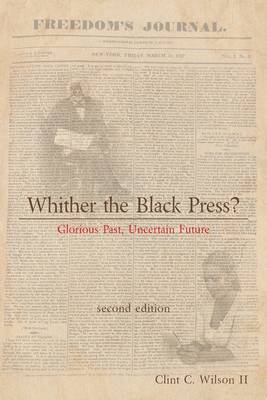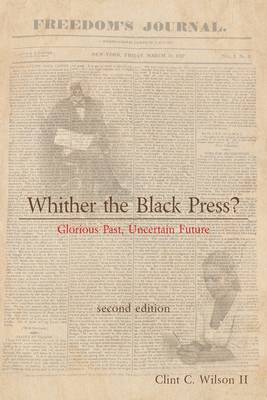
- Retrait gratuit dans votre magasin Club
- 7.000.000 titres dans notre catalogue
- Payer en toute sécurité
- Toujours un magasin près de chez vous
- Retrait gratuit dans votre magasin Club
- 7.000.0000 titres dans notre catalogue
- Payer en toute sécurité
- Toujours un magasin près de chez vous
16,95 €
+ 33 points
Format
Description
Those who have wondered whatever "happened" to the Black press will find answers in this informative and entertaining book that addresses the various issues that contributed to the decline of African American newspapers and examines whether new media platforms of the 21st century can fill the void. Written by a recognized Black press scholar and professional journalist, the book explores the historic development of African American newspapers from their African roots to the founding of their first weekly journal and into the glory years as the communication foundation for the Civil Rights Movement. In the process the author reveals little known facts about the ways in which the Black press wove itself into the fabric of American culture among the White and Black populations. Along the way this easy-to-read volume brings to life interesting historical facts including: -- The early development of literary and publishing endeavors among Black people in colonial America and what Thomas Jefferson wrote about them. -- The ironic consequences that visited White publications following the U.S. Supreme Court's racial segregation decision in Plessy vs. Ferguson. -- The roles played by aviation pioneers Wilbur and Orville Wright in the launch of a Black newspaper published by Paul Laurence Dunbar. -- How the Black press reacted to the controversial success of the Amos 'N' Andy radio show in the 1930s. -- Why the Black press found itself at a disadvantage in reporting the Civil Rights Movement for which it had been largely responsible. -- What factors led to the strained relationship between the Black press and African American journalists who work for White-owned news organizations. Whither the Black Press? is a well written, interpretive historical account of African American newspapers and their struggle for survival against the backdrop of hegemonic White political, social and economic forces. It brings perspective and understanding of how a venerable African American institution journeyed through a glorious past into an uncertain future.
Spécifications
Parties prenantes
- Auteur(s) :
- Editeur:
Contenu
- Nombre de pages :
- 186
- Langue:
- Anglais
Caractéristiques
- EAN:
- 9781664152649
- Date de parution :
- 25-01-21
- Format:
- Livre broché
- Format numérique:
- Trade paperback (VS)
- Dimensions :
- 152 mm x 229 mm
- Poids :
- 281 g

Les avis
Nous publions uniquement les avis qui respectent les conditions requises. Consultez nos conditions pour les avis.






